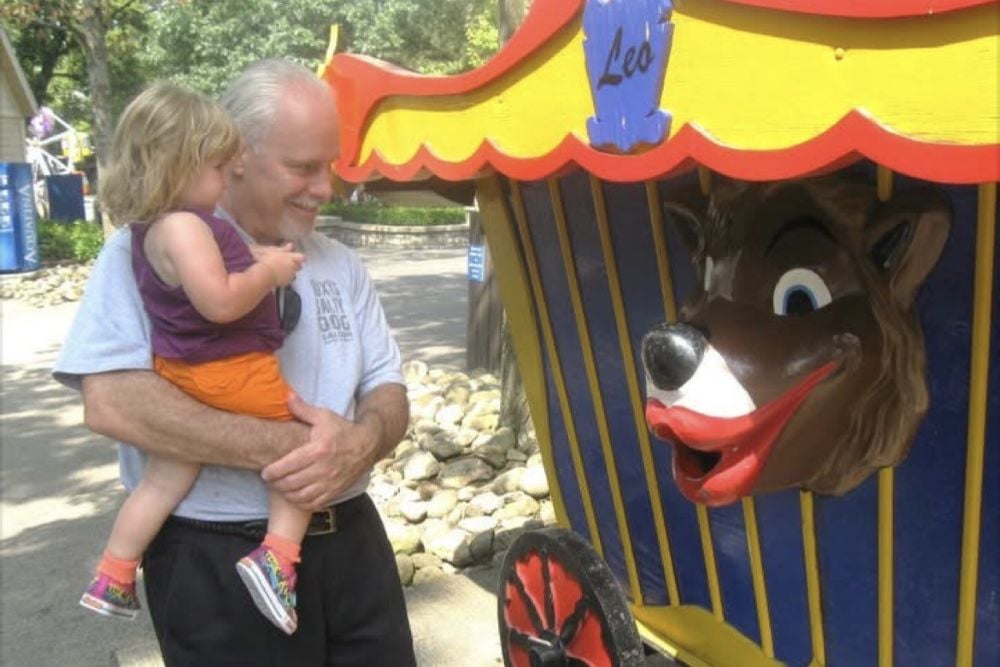2024 Pittsburgher of the Year: Christina Cassotis
The charming but no-nonsense CEO of the Allegheny County Airport Authority is spearheading a revolution in air travel for the Steel City.
Christina Cassotis didn’t just flunk out of college the first time around — she flamed out spectacularly and defiantly.
At 19, she went to the University of New Hampshire to study business at the insistence of her father, but she hated the classes so much that she stopped showing up in her sophomore year. It all seemed so pointless, going to a nearby school with a lot of the same people with whom she grew up. When her father, a strong-willed commercial airline pilot, saw the string of Fs on her report card, he told his equally strong-willed daughter, “You’re on your own.”
That reprimand turned into lifelong resolve and a passion for blazing her own trail.
She started by moving to Boston to become a server and bartender. Serving drinks and meals to the city’s upper crust, she learned the fine art of reading people. Were they in a hurry? Were they trying to impress their dates? Living largely on tips, that skill paid off, sometimes earning her $300 or $400 a night.
Decades later, after being named the CEO of the Allegheny County Airport Authority in late 2014, Cassotis used the same knack for reading people to sell Pittsburghers on a completely new type of Pittsburgh International Airport.
Whirling into Pittsburgh like a strong tailwind behind a 747 jetliner, the New Englander was blunt. She told Pittsburghers the hub was not coming back. The airport — which opened in 1992 as the largest hub for US Airways, its dominant airline at the time — no longer fit that model. The financially troubled airline pulled out of the hub in 2004, leaving the airport authority saddled with debt and empty gates. It no longer was a place where a large percentage of travelers changed planes; it was now an origin-destination airport.
“First I had to drive a stake in the heart of the hub, because Pittsburghers thought that’s the only way you succeed. No, the industry changed, and we’re not going backwards.”
In her 10 years at the helm this January, Cassotis has increased the number of nonstop destinations from 36 to 61; attracted new airlines; brought back nonstop international routes, including British Airways, which now flies to London Heathrow; and increased annual passenger traffic from about 8 million a decade ago to around 10 million in 2024, a 25% jump.
And she has innovated. Pittsburgh International became the first major airport in the world to run on its own natural gas and solar energy microgrid. Even in the midst of the pandemic, she forged ahead with a new $1.57 billion landside terminal, funded without any taxpayer money and scheduled to open later in 2025. The ultimate outsider, she shook things up. For that and more, she is Pittsburgh Magazine’s Pittsburgher of the Year for 2024.
“We Pittsburghers are not always willing to accept change,” says Rich Fitzgerald, the former county executive who hired her. “We can be a little provincial. ‘Who is this woman from Boston telling us we can’t have a hub?’”
But by pushing past local resistance, he says, “she saved the airport.”
‘Wicked Strong Opinions’
With a hard hat on her head and safety glasses covering her dark rectangular frames, Cassotis walks briskly through the construction site of the new airport terminal. She stops at one of the red safety barriers, twirls around and waves on the members of her senior leadership team who have joined her on this weekly tour.
A flurry of motion, she rushes up to a few men and tucks in the back tags of their shirts. Then she stops herself: “I don’t want to be their mother.”
The tour guide is Rob Bramblett, the project executive who is overseeing 1,000 workers on the site this day. He points to the undulating roof — intended to evoke Pittsburgh’s rolling hills — held up by metallic tree branches painted light gray. “Every tree branch is a little bit different. It mimics what you see in the forest,” Bramblett says.
“Like anyone will notice,” Cassotis quips, generating a laugh from her crowd.
What visitors will notice are the bridge and tunnel, inspired by the Fort Pitt Tunnel’s dramatic entrance to the Golden Triangle. Instead of the city’s skyline, this connector between the landside and airside terminals will open up to a modernized central core roughly the size of Downtown’s Market Square, with new shops. She wanted to create an airport uniquely for Pittsburgh, reflecting its landmarks and topography.
Cassotis grows even more animated when she walks outside to a terrace, which will contain landscaping native to the region. The terraces will be featured on both landside and airside. Access to nature and outdoors is good for the mental health of both travelers and employees, she says.
She outlines the progress of the project during a meeting with department heads. She’s dressed in understated chic attire — a dark top and flowing wrap over a pencil skirt. Her hands flutter as she talks, almost as though she is conducting a symphony. But she’s conducting the opening of the new landside terminal — one that many Pittsburghers thought they didn’t need.
If you tell her the existing airport is still new, she stares right at you, her brown eyes blazing, and says, “Why do you think that?” She reminds people that the landside terminal is now more than three decades old. It no longer works for a non-hub model — everything from the slow baggage claim to the antiquated tram system that would require expensive repairs (the tram is eliminated in the new terminal design).
The youthful 60-year-old is charismatic, even funny, in front of the department heads. But her demeanor changes when the sound of someone clacking loudly on his laptop disrupts her rhythm. “Whoever is doing that, stop it,” she says. The offender shuts his laptop.
That no-nonsense demeanor — what she calls “wicked-strong opinions” — didn’t go over well with some employees. She received hate mail when she announced that employees would no longer receive promotions based on seniority.
“You don’t know how things work around here,” someone yelled after she instituted Uber pickup at the airport soon after she was hired. “Who do you think you are? You think you just come in here and change things?”
“Yeah, I actually do,” Cassotis replied. “That’s my job. My job is literally to kick over rocks. We have to do things differently if we’re going to get different results.”
She decidedly shook things up in 2022, when she evicted Fraport, the operator of the airmall, from the airport, accusing it of security breaches, an accusation the retail operator denied. The ouster resulted in a contentious court battle and a $10.5 million settlement.
She also has weathered criticism about her $254,718 bonus last year — on top of a $566,040 salary — after County Controller Corey O’Connor filed a motion with Common Pleas Court for a declaratory judgment as to whether bonuses should be part of the county pension system. He said the airport bonuses would jeopardize the already strained pension fund. “Why is he going after the airport?” she said about her initial reaction. “You’re not going after the fact that the pension is underfunded.” Ultimately, the controller and the airport were on the page.
Cassotis also bristled when Allegheny Council President Patrick Catena held a press conference in October raising safety concerns about cracks in the concrete of the new airport parking garage — without first contacting her. She said her team identified the cracks a month before and had already devised a plan to fix them and ensure safety. She says that cracks can sometimes occur in construction.
Thomas Kinton, an airline consultant based in Winchester, Massachusetts, says he has seen both sides of Cassotis: “She’s got a really good sense of humor. That’s the side I want to be on. If you get in her way, and you’re not on board and you’re not growing in the direction she wants to take this place, then she’s going to ask you to step off and move on. That’s the only way she’s going to get things done. She really put Pittsburgh [International Airport] on the map.”
Rebellious and Determined
That kind of confidence has been a theme in her life from her earliest days as the oldest child of a commercial pilot and stay-at-home mother.
Her late father, Jim, was a pilot first for the Marine Corps and then Pan Am and United, a career that took the family to Hong Kong when she was 3. By age 5, she had been on four international flights, says her mother, Jean Cassotis. “She loved flying.”
About that time, the family settled in Londonderry, New Hampshire, less than an hour from Boston. It was an idyllic childhood with many neighborhood kids, a golden retriever and a backyard pool. After her father took her to a flight simulator at Pan Am’s Flight Simulator in Miami, she knew she didn’t want to be a pilot — too stressful.
She had the high-achieving-big-sister personality and was a good big sister to her three younger siblings, says Jean, who still lives in New Hampshire.
“She was a really good kid,” Jean says. “Then she turned 15 and walked through that revolving door that a lot of teenagers go through,” of being rebellious and no longer wanting to go on family outings.
Her biggest rebellion was her epic fail at college. “I burned it all down,” Cassotis says.
While waiting tables to support herself, she dipped her toes into a series of different fields in her 20s. Thinking she wanted to be a social worker, she counseled rape survivors at a nonprofit. She talked her way into writing lifestyle pieces for Manchester Magazine, eventually working her way up to deputy editor. At other times in her career, she started a catering business and bought and ran an upscale children’s-clothing store.
“Christina was resilient, confident and determined,” Jean says.
Cassotis kept trying on different careers — and eliminating them. “I’m incredibly ambitious,” she says “I want to make a difference. I want to solve problems and I didn’t know where I fit in.” All around her, friends were settling down into jobs and marriages. People asked if she was worried about being left behind. Not at all. That just wasn’t her.
At age 26, she went back to get her undergraduate degree and contacted her father about possible support with tuition. He told her that ship had sailed. He had three other kids to put through school.
Relying on those waitressing gigs to pay her own way, she earned a bachelor’s degree in English from the University of Massachusetts Boston.
One day while working at the restaurant, she served a state representative who told her about a writing job in the communications department of the state’s Department of Energy Resources. That led to her next job as deputy director of communications for the Massachusetts Port Authority, or Massport, which oversaw Boston Logan International Airport.
She realized this is where she belonged — the space to channel her ambition. “I love travel, and I love airports,” she says. “To me, it’s all possibility.”
But she received the tough assignment of gaining public support for a runway at Logan that had been stopped 25 years earlier, when a brigade of mothers with strollers blocked construction vehicles. They didn’t want it encroaching on their neighborhood. But even in her 30s, she had mastered a communication strategy that eventually led to the runway reopening.
“She’s very charismatic,” says Deborah Meehan, then-president and CEO of SH&E, who was a consultant on that project. “She has a confidence about her that is infectious.”
In fact, Meehan was so impressed by the driven young woman that she hired her as an airport consultant for the aviation consulting firm.
While consulting with airport executives around the globe, Cassotis also pursued her MBA from the Sloan School of Management at the Massachusetts Institute of Technology. It was at this time, at age 47, that Cassotis was diagnosed with ADHD. The diagnosis of attention-deficit/hyperactivity disorder made sense to her — she could see the big picture of complex issues yet was always losing her keys. (The medication she takes keeps her focused.)
Two days before she received her MBA in June 2014, she was laid off. It was an abrupt termination, at 8 a.m. — in an airport lounge.
Reinventing an Airport
Soon after, she got the call from a headhunter asking her if she wanted to be considered for the job in Pittsburgh.
Pittsburgh? No way, she thought. It wasn’t a diss on the city, but the airport. “Why would anybody go to Pittsburgh?” she says. “We watched when the hub was taken down — it was sort of a horror in the industry.”
But she figured it wouldn’t hurt to come out for an interview. When she convinced Fitzgerald that the hub model was dead, she signed up for the challenge of reinventing the airport.
“I really want this job,” she told her husband, Tim, a retired lobbyist and former math teacher who met her while she was bartending. “They lost everything, and they know it, and they know what it means if they get it back and they actually care.”
“I’m not moving to Pittsburgh,” he said, wanting to stay near the ocean and their extended family.
“Well I am,” she said.
Eight months later, he joined her, waiting until their son finished the school year. Cassotis then told her husband they would only stay for three years. After all, she has a tight-knit family in New England, where they hold clambakes every Labor Day and get together for Greek Easter.
Family and food are still a big priority for her, aided by the miracle of air travel. Because her son, Timothy, who won regional championships as a golfer at Sewickley Academy, is now a student at the University of St Andrews in Scotland, she and her husband flew over for Thanksgiving with fixings for a feast, including stuffing and canned cranberry sauce that she knew she couldn’t get there. She sent students home with leftovers.
They flew in and out of Pittsburgh International Airport. By next Thanksgiving, she likely will fly in and out of the new terminal — one that she can’t wait to show off to Pittsburghers.
“What I’m most excited about is having people in Pittsburgh look at themselves differently as a result of the airport,“ she says. “This is a massive face-lift to the front door of a community that deserves a better front door. This is us. This is what we deserve.”
Cristina Rouvalis is a frequent contributor to Pittsburgh Magazine. She is the co-author of “Snoopers & Sneakers,” a middle-grade novel that is being published in January.


















